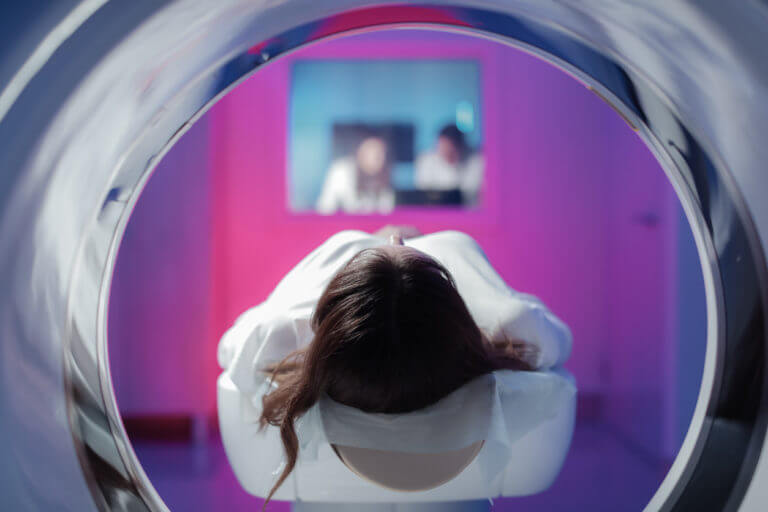
An MRI (magnetic resonance imaging) is a safe and painless scan that is performed on part of your body to produce a collection of detailed images of the structures and tissues for your doctor’s evaluation. The key benefit of having scans such as an MRI is that your physician can assess a given area without the need for invasive surgery, which is what doctors had to do before imaging technology existed.
An MRI of the brain provides an accurate depiction of the brain tissues and any abnormalities. It may be prescribed for a number of different reasons, such as to identify the cause of certain symptoms or to diagnose or monitor a range of health conditions, from multiple sclerosis to seizures.
What Is an MRI?
Magnetic resonance imaging uses strong magnetic fields, radio waves, and a computer to create detailed images of the inside of the body. Unlike many other types of imaging tests, it does not use radiation – and it is the most accurate and sensitive imaging test for brain scans in modern medicine.
An MRI scan can help your doctor to diagnose conditions and injuries, plan suitable treatments, assess the effectiveness of a treatment, or to track the progression of a condition. The procedure can be used to examine virtually all parts of the body, especially the following:
- Brain
- Spinal cord
- Heart and blood vessels
- Internal organs
- Breasts
- Bones and joints
A traditional MRI machine is a large, hollow, tube-like device that is open at both ends. The scanner is well lit (not too dark), and it has a gentle fan to ensure you are comfortable. However, it can seem daunting, and some patients feel claustrophobic. It is a good idea to close your eyes and keep them closed before you are brought into the scanner and during the entirety of the scan, so you can picture yourself just sleeping on your own bed.
In contrast, an open MRI is ideal for claustrophobic or anxious patients, pediatric patients, or patients who are large. Its wide, open design helps patients to feel more comfortable and less enclosed during the scan.
How Do I Prepare for a Head MRI Scan?
There usually isn’t much preparation required for a head MRI, unlike other parts of the body which may require more preparation beforehand. Due to the strong magnetic field used during the procedure, all metal items will need to be removed prior to the scan (jewelry, body piercings, and clothing with metal fasteners or zippers). If you have any metal fragments or metal implants in your body, you should make your physician aware of this prior to your procedure.
Your MRI scan may require that you have an injection of gadolinium, which is an intravenous contrast medium that is used to improve the diagnostic accuracy of the MRI scan by producing more distinct images. Your doctor may even order the scanning facility to capture some scans of your brain without the gadolinium, and then to give you the contrast solution and take further scans, for a before-and-after comparison.
Gadolinium is not recommended for people with certain health conditions, such as kidney disease or during pregnancy.
At Your MRI Scan Appointment
At the MRI appointment, you may be asked to change into a hospital gown. You will be asked to lie down on a special table that slides into the scanner, and you will be made as comfortable as possible with the use of pillows and a blanket. You will need to keep as still as possible for the scan in order to ensure clear images.
If your scan requires that you have an injection of gadolinium, you may feel a cold sensation in the arm or experience a slight temporary metallic taste. Your body will naturally absorb and eliminate the gadolinium within the next day or two.
The MRI scanner produces strange, sometimes loud, quirky, or banging noises when taking pictures of your brain. You will be given earphones to wear during the procedure to minimize the noise, and you will be asked for your preference of music or other audio.
Although your MRI operator will be in a separate room, they will be able to see you and to communicate with you at all times. There is an intercom in the scanner allowing you to talk between scans; you can also verbalize if you are having any problems.
How Long Does an MRI Take?
The time taken for an MRI scan varies depending on the type of scan, but a brain MRI typically lasts from 30 to 60 minutes.
After your MRI, your radiologist will check to ensure that they have all the necessary images. Medical staff will help you stand up from the table slowly to avoid any lightheadedness.
Following the procedure, a radiologist will examine your MRI scan and produce a written analysis of the results for your doctor. You will receive your results within a few days.
MRI Scanning Center
If you require an MRI brain scan, Associates in Neurology is here for you. Our radiologists have years of experience in diagnostic and interventional radiology, and we use the most advanced imaging technology to produce highly detailed scans.
If you have any questions or would like to schedule an MRI scan, contact our friendly staff today. We look forward to serving you!


